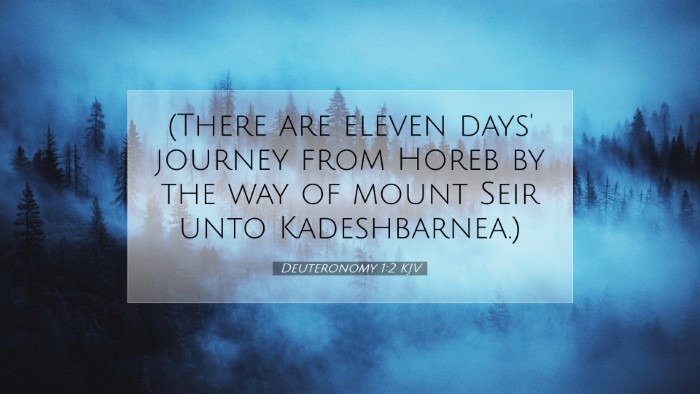Commentary on Deuteronomy 1:2
Verse Reference: Deuteronomy 1:2 - "There are eleven days' journey from Horeb by the way of mount Seir unto Kadesh-barnea."
This verse may seem straightforward, but it carries profound implications regarding the journey of the Israelites and their relationship with God. In exploring this verse, we draw upon insights from several public domain commentaries including those from Matthew Henry, Albert Barnes, and Adam Clarke.
Contextual Overview
Deuteronomy is a recapitulation of the Law provided to the Israelites by Moses as they prepare to enter the Promised Land. This particular verse sets the geographical context for their wandering and highlights the contrast between their intended journey and the reality of their 40 years of wandering due to disobedience.
Moses' Narrative
Moses’ Role: Moses, as the leader and lawgiver, speaks to the Israelites with the authority that comes from experience. His recounting of their journey serves to remind them of God’s promises and their failures. He emphasizes the significance of their location — the plains of Moab, where they stand on the brink of the Promised Land.
Meaning of the Journey
Symbolism of the Number Eleven: The mention of "eleven days' journey" indicates a typical duration needed to traverse a certain distance, emphasizing the Israelites' prolonged journey caused by their lack of faith. This brevity underscores their failure to trust God fully, manifesting in a detour that extended their trip to forty years (Numbers 14:29-30).
The Route and Its Significance: The reference to "Horeb" (also known as Sinai) evokes memories of their covenant with God — the giving of the Law. Travel from Horeb to Kadesh-barnea symbolizes not only a physical journey but also the spiritual path the Israelites were meant to undertake, being led by God into the promised blessings.
Theological Implications
This verse encapsulates the overarching theme of divine guidance and human responsibility. The relatively short distance highlights the potential for a more direct path if they had remained obedient. Instead, their rebellion led them into a prolonged period of hardship, which serves as a cautionary tale for future generations.
Spiritual Reflection for Today:
- God’s Promises: The faithful promises of God require our cooperation and obedience. Just as the Israelites could have reached their destination sooner, we too may find our spiritual journeys are delayed by our lack of faith.
- Wandering and Its Consequences: Reflecting on their forty years in the wilderness, we learn that disobedience often leads to spiritual barrenness and delays in fulfilling God's purpose in our lives.
Insights from Commentators
Matthew Henry
Matthew Henry emphasizes that this “eleven days’ journey” signifies how quickly the destination could have been reached if they had obeyed. Henry highlights the stark reality that many Christians today follow similar paths of disobedience which results in unnecessary delays in spiritual growth.
Albert Barnes
Albert Barnes notes the importance of geography in understanding God's plan. He argues that the intended journey corresponds with the faithfulness and readiness of the people to follow God's lead. Barnes also suggests that the mention of the distance serves to shame the Israelites for their prolonged journey, reiterating God's provision and disappointment in their choices.
Adam Clarke
Adam Clarke provides a detailed exposition of the geographical locations mentioned, noting how proximity to their promised inheritance is emblematic of God's readiness to bless His people. His commentary implies that the journey serves as both a literal and figurative bridge between slavery in Egypt and freedom in Canaan, highlighting the importance of obedience in achieving divine promises.
Concluding Thoughts
This verse encapsulates a critical moment in Israel's history and serves as a powerful reminder of the importance of alignment with God’s will. For pastors, students, and scholars, Deuteronomy 1:2 is not just a historical account but a reflective commentary on faithfulness, obedience, and the nature of God’s guidance in our trials.
As we study this verse, let us contemplate our own journeys, the detours we might have taken, and the ways in which we can seek to align our steps with God's intended path for us. In faithfulness lies the pathway to experiencing the fullness of God's promises.


